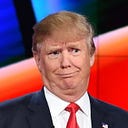Day 937: Schrödinger’s tariffs: Trump claims that applying tariffs is good, not applying tariffs is also good
Donald Trump has never understood tariffs, trade wars, or economics in general. He has lied, tanked the stock market and displayed breathtaking ignorance that has been undercut by his own economic aides.
Now, he’s at it again.
After failing to make a deal with China and threatening more tariffs on Chinese goods, Trump blinked and agreed to put off the tariffs until December. His reasoning is curious, considering his past claims.
“We’re doing this for the Christmas season,” Trump told reporters on an airport tarmac around noon Tuesday. “Just in case some of the tariffs would have an impact on U.S. customers.”
Trump has previously called himself a “tariff man” happy to take in billions of dollars from China, including as recently as Wednesday.
Except that’s not how tariffs work. The government doesn’t take in a penny from tariffs, much less billions of dollars. White House economic adviser Larry Kudlow has acknowledged that Americans are the ones that ultimately end up paying the cost of tariffs.
It’s not particularly complicated, either.
Let’s get something straight: importers pay tariffs, not exporters.
President Trump, who has made trade policy one of his top priorities, still doesn’t know this after two-and-a-half years in office. He thinks the Chinese are paying the 25% tariffs he imposed last year on $250 billion worth of their imports. He keeps ballyhooing the tariff income pouring into the Treasury and gleefully claims it’s all coming from China.
None of it comes from China. It all comes from American businesses that import Chinese goods. As of June 30, they had paid $50.5 billion in tariffs during this fiscal year, according to the U.S. Treasury’s Monthly Treasury Statement. That includes all U.S. tariffs, not just those imposed on imports from China.
A May 2019 study by economists from Harvard University, the University of Chicagoand the Federal Reserve Bank of Boston on the impact of tariffs on the U.S. economy found that the cost of tariffs “has fallen largely on the U.S.”
Companies in the U.S. importing tariffed goods from China are paying higher costs. In many cases, those higher costs are passed on to the American consumer. If the cost to import a washing machine goes up 10%, the cost to the customer may also rise 10%. In any event, in no way is Beijing writing a check to Washington.
Trump’s decision to not impose new tariffs on Chinese goods reveals that he may finally understand the effects that tariffs are having on everyday Americans. However, he’s still talking out of both sides of his mouth.
Trump likely knows that holiday shoppers buying goods — such as laptops, phones and other electronic devices — at a higher cost as a result of tariffs would see right through his lie that tariffs are beneficial to consumers. But “tariffs are good” is a lie he has told for years, so he can’t just give it up overnight.
Instead, Trump has put himself in an impossible middle ground of Schrödinger’s tariffs, arguing that they are simultaneously good when applied and good when removed.
937 days in, 525 to go
Follow us on Twitter at @TrumpTimer
